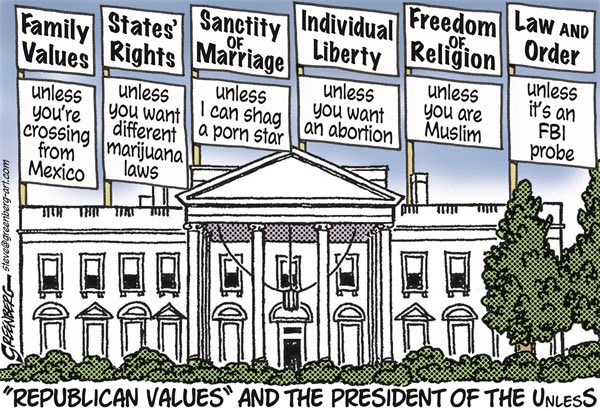Sunday, May 27, 2018
Thursday, May 24, 2018
Hidalgo v. Emmett
Before I start ripping the skin off the Texas Democratic slate (thanks to Horwitz in the comments yesterday for helping me get warmed up, by the way), I'll say something nice about the locals, .i.e. Harris County executive races. Dr. Diane Trautman (County Clerk), this blogger being a longtime fan, and Marilyn Burgess (District Clerk) both prevailed in Tuesday's runoff and should be able to do the same against hapless Republicans Stan Stanart and Chris Daniel in the fall.
One of those is more hapless than the other, as even Harris Republicans clearly understand.
More on that race at a later date; from my inbox late yesterday came this press release and poll from the Hidalgo for Judge campaign that -- despite its D lean -- has to have surprised a few people. Under the header "Hidalgo leads Emmett 53% to 47%" ...
Perhaps more than the usual polling caveats apply. There's no link to the poll in the email and none that I can find on Hidalgo's website; mighty Kuffner hasn't gotten around to this news yet. (Speaking of slow reactions, if he ever wrote anything about the debate between Lupe Valdez and Andrew White, then I missed it. Candidly I'm of the considered opinion that his blog has gone so far downhill so fast it's not worth much of my time any longer, but YMMV. He very rarely blogs about anything I haven't already read in the Houston Chronicle or the Texas Tribune. Like Blue Dog Ted at jobsanger, though, Kuff coughs up his 4-6 posts early every morning, so there's that. Consistent quantity counts for something even when quality suffers.)
More from the poll:
Hidalgo is very likely the most progressive woman on the Harris County ballot. Bar none ... at least until Janis Richards gets qualified to run for governor as an independent, which we should know about soon, as her 500 signatures are due in Austin shortly to be verified. But most importantly, Hidalgo and Lupe Valdez and Sylvia Garcia and all of the rest of the Latinos and Latinas on the statewide and county ballot are a reminder that 2018 is a no-excuses year for Latin@ turnout. Nobody should be compelled to buy any keys to turnout from Marc Campos, either; he's the same moron he's always been. (I give Campos a lot of crap, but his blog wins awards this blog has never won, you know. So I'm jealous of all the #winning.)
David Collins, himself a previous Harris Judge contender, approves of Hidalgo, and since I have not met her yet, that's good enough for me.
Let's expect that our endorsements don't piss off any bitter #StillbornHerz so much so that they can't vote for Lina out of spite for me or Collins. I'd like to believe those folks are bigger persons than I am about petty purity politics, after all, but with the Churchill Downs stable of horseshit and slander I read against Laura Moser and continue to read about Bernie Sanders ... well, let's just say Kuffner is wrong again, but has a chance at being right in time for November. Maybe he can use his clout to talk some sense into his team; something like, "there's not very many of those awful progs, and we can replace their votes with Republican crossovers, so just put PDiddie on 'ignore'" or something.
Stace is happy, so maybe we'll read more there about politics and less about Tejano music. (Really and truly, dude. It's not as bad as Greg Wythe's defunct blog posts about Trinity Euless football, or the latest from Lakewood Church, but it's close. Go the full La Raza or get back to what you used to do best, is all I'm sayin'. Us gabachos lack insight into the Mexicano mindset which we can't get from Lalo Alcarez or News Taco. Don't regress to the level of Neil A-Queen-o, for cryin' out loud.)
Okay then. The rest of my acid gets directed at all the white NeoDemocrats running for office who will spend the next five months chasing conservative votes. Another clarification of the definition of 'progressive' is sorely overdue. That's on the way, haters. Enjoy your Memorial Day weekend and don't forget why we observe it.
One of those is more hapless than the other, as even Harris Republicans clearly understand.
If you’re wondering why #FireStanStanart trends every #ElectionDay, I have literally watched as Republican elected officials call the Harris Co. Clerk & chew him out about returns, and they’re in the same party. #tx2018— Miya Shay (@miyashay) May 23, 2018
More on that race at a later date; from my inbox late yesterday came this press release and poll from the Hidalgo for Judge campaign that -- despite its D lean -- has to have surprised a few people. Under the header "Hidalgo leads Emmett 53% to 47%" ...
The Lina Hidalgo campaign for Harris County Judge today released the results of its first county-wide poll, showing the Democratic challenger leading the Republican incumbent by a stunning six percentage points; among Harris County voters who plan to vote in the County Judge race, 53% plan to vote for Lina Hidalgo and 47% say they will vote for Ed Emmett.
The poll, conducted by Texas Democratic Party-authorized polling firm, Change Research, surveyed more than 1700 registered voters in Harris County on May 11, 12, 13, 19, and 20, and has a margin of error of +/- 3%.
Perhaps more than the usual polling caveats apply. There's no link to the poll in the email and none that I can find on Hidalgo's website; mighty Kuffner hasn't gotten around to this news yet. (Speaking of slow reactions, if he ever wrote anything about the debate between Lupe Valdez and Andrew White, then I missed it. Candidly I'm of the considered opinion that his blog has gone so far downhill so fast it's not worth much of my time any longer, but YMMV. He very rarely blogs about anything I haven't already read in the Houston Chronicle or the Texas Tribune. Like Blue Dog Ted at jobsanger, though, Kuff coughs up his 4-6 posts early every morning, so there's that. Consistent quantity counts for something even when quality suffers.)
More from the poll:
94% of Harris County voters report feeling more interested (56%) in or equally as interested (38%) in the 2018 election as they have felt about prior elections.
President Trump is viewed unfavorably by 60% of Harris County voters
Voters report that the three issues that will drive their voting behavior most in November are:
1. Government transparency
2. Education
3. Jobs
Hidalgo is very likely the most progressive woman on the Harris County ballot. Bar none ... at least until Janis Richards gets qualified to run for governor as an independent, which we should know about soon, as her 500 signatures are due in Austin shortly to be verified. But most importantly, Hidalgo and Lupe Valdez and Sylvia Garcia and all of the rest of the Latinos and Latinas on the statewide and county ballot are a reminder that 2018 is a no-excuses year for Latin@ turnout. Nobody should be compelled to buy any keys to turnout from Marc Campos, either; he's the same moron he's always been. (I give Campos a lot of crap, but his blog wins awards this blog has never won, you know. So I'm jealous of all the #winning.)
David Collins, himself a previous Harris Judge contender, approves of Hidalgo, and since I have not met her yet, that's good enough for me.
Let's expect that our endorsements don't piss off any bitter #StillbornHerz so much so that they can't vote for Lina out of spite for me or Collins. I'd like to believe those folks are bigger persons than I am about petty purity politics, after all, but with the Churchill Downs stable of horseshit and slander I read against Laura Moser and continue to read about Bernie Sanders ... well, let's just say Kuffner is wrong again, but has a chance at being right in time for November. Maybe he can use his clout to talk some sense into his team; something like, "there's not very many of those awful progs, and we can replace their votes with Republican crossovers, so just put PDiddie on 'ignore'" or something.
Stace is happy, so maybe we'll read more there about politics and less about Tejano music. (Really and truly, dude. It's not as bad as Greg Wythe's defunct blog posts about Trinity Euless football, or the latest from Lakewood Church, but it's close. Go the full La Raza or get back to what you used to do best, is all I'm sayin'. Us gabachos lack insight into the Mexicano mindset which we can't get from Lalo Alcarez or News Taco. Don't regress to the level of Neil A-Queen-o, for cryin' out loud.)
Okay then. The rest of my acid gets directed at all the white NeoDemocrats running for office who will spend the next five months chasing conservative votes. Another clarification of the definition of 'progressive' is sorely overdue. That's on the way, haters. Enjoy your Memorial Day weekend and don't forget why we observe it.
Wednesday, May 23, 2018
Yay establishment.
Woo hoo moderates and centrists. Clap for the conservaDems (and for that matter, the same standing-in-the-middle-of-the-road armadillos in the TXGOP.) Dilly "pragmatists".
Moser was being complimentary; it's simply not accurate to call non-voters a voting bloc.
How's that worked out for ya in the last twenty years, Donks?
That question was answered emphatically: 'let's keep doing the same thing we've always done, and hope for a different result'. Good luck in November, Mules.
Expect a #DemExit again. It's really not an even split as the toon suggests, but the prags do get the ass. I like the red shirts on the left, too.
I'll have a lot more about last night later.
(Laura Moser) spent a recent Saturday walking from door to door in the Houston suburb of Cypress, trying to convince voters who rarely come out to the polls in Texas’s Seventh District to support her progressive agenda in the Democratic primary runoff Tuesday.
These are the voters Texas Democrats want to see turn out in droves during the 2018 midterms. But in past years, they haven’t had a lot of success convincing them.
“You’re the most powerful voting bloc in the country,” Moser told one skeptical resident. “If everyone voted, you would get people representing you who looked like you.”
Moser was being complimentary; it's simply not accurate to call non-voters a voting bloc.
Houston is Moser’s hometown, and like the rest of the state, it has diversified since she grew up here. Many people working on their lawns or sitting outside in Cypress spoke Spanish, and a group of Latino and African-American children raced their bikes up and down the cul-de-sac.
Several neighborhood residents told Moser they don’t often see candidates for Congress knocking on doors as she encouraged them to get out and vote during the May 22 election.
This lines up with how Democrats have historically tried to win races in Texas — paying more attention to voters they know will turn out reliably. The Democratic Congressional Campaign Committee (DCCC) typically backs moderate candidates who they believe will appeal to independents and Democrats, and be more competitive against Republican incumbents.
How's that worked out for ya in the last twenty years, Donks?
The DCCC is following the same playbook this year, favoring Moser’s opponent in the runoff, Lizzie Pannill Fletcher. The DCCC hoped Moser wouldn’t make it this far, dropping an opposition research file on her ahead of the March primary — a decision that backfired and seems to have helped propel Moser into this week’s runoff this week. The organization has stopped short of explicitly backing Fletcher ahead of the runoff, but she’s clearly their preferred candidate.
Tuesday night (tested) which path appeals to Texas Democrats: Are they are still rooted in the center, or does their future lie in changing demographics and embracing a progressive ideology? More broadly, the TX-7 race has become emblematic of the conflict between the Democratic establishment and its newly emboldened progressive base, who wants to see the party swing left.
That question was answered emphatically: 'let's keep doing the same thing we've always done, and hope for a different result'. Good luck in November, Mules.
Expect a #DemExit again. It's really not an even split as the toon suggests, but the prags do get the ass. I like the red shirts on the left, too.
I'll have a lot more about last night later.
Monday, May 21, 2018
The Weekly Wrangle
The Texas Progressive Alliance weeps for the families of the Santa Fe victims, the latest in America's ongoing carnage of gun violence and the predictable aftermath of excuse-making and inaction by our bought-and-paid-for lawmakers.
Everything is bigger in Texas, and Dan Patrick broke records for his creative ignorance, first blaming school exit doors, and later video games and even women's reproductive choice. He also referred to something called a "well-run militia", which appears nowhere in the Constitution. Brand-new NRA president Oliver North fingered Ritalin as the culprit.
(Odd that cowardice and white privilege weren't mentioned to any prominent degree. The killer's parents -- you might have read he used his father's guns -- remain in deep denial.)
Greg Abbott claimed he might do something, and was challenged to do so, but his response so far has been long on thoughts and prayers and short on action. HPD chief Art Acevedo got 15 minutes of social media fame by having his Facebook post picked up by the NYT. State Rep. Gene Wu Tweeted "y'all" a couple of times in solidarity.
And it's almost time for the cycle to start anew.
A few bloggers and news sources weighed in: Somervell County Salon has Jimmy Kimmel's reaction. Socratic Gadfly called out Abbott for both his usual hypocrisy and his egotism after the killings. And Casey Fleming does not want to have to write about school shootings ever again. (Good luck with that, buddy.)
Last but most importantly, No More Mister Nice Blog eviscerates the New York Times for perpetuating the myth that Texans love their guns.
All of this may be true, and the story goes on for sixteen more paragraphs in this fashion. But then we're told:
Polling shows the state’s voters are more split on guns than popular culture might indicate. According to an October poll by the University of Texas and The Texas Tribune, more than half of the registered voters surveyed said gun control laws should be stricter. Only 13 percent said the laws should be less strict than they are now, and 31 percent would prefer to leave current gun laws unchanged.My response is: So it's not "popular culture" that's misinforming us about Texans' attitudes regard gun laws -- it's you, New York Times. It's you saying that "guns are hard-wired into the state’s psyche" and quoting (as the story goes on to do) primarily Republican politicians and residents of this rural community. (Texas isn't a rural state -- it has four of the eleven most populous cities in America. City dwellers are Americans, too -- and city dwellers in Texas are Texans.)
I wish this story had examined the disjuncture between the widespread support for at least some tightening of gun laws and the political impossibility of tightening in many parts of America. In Texas, it's not because keeping the gun laws loose is the will of the state's residents -- the poll numbers make that clear -- but because the minority that resists change is dominant. The story could have made clearer that that's what's going on, rather than implying that love of unrestricted guns is essential to the entire state's culture and we liberals just don't understand.
This week's Wrangle contains some election news ahead of tomorrow's vote, and some lighter reading posted before Friday's tragedy.
Five Thirty Eight previews the Texas runoffs.
Races to watch: 7th, 21st, 23rd and 32nd congressional districts; governor
Polls close: 8 p.m. Eastern in most of the state, 9 p.m. Eastern in El Paso and Hudspeth counties
Wait, didn’t Texas already hold its primaries? Well, yes, but more than 30 contests needed to go into overtime because no candidate received 50 percent of the vote. Those runoffs, between the top two finishers from March 6, take place Tuesday.
In the final days of the Democratic primary for Texas’s 7th Congressional District, the Democratic Congressional Campaign Committee ignited a controversy by releasing opposition research against one of its own candidates, progressive activist Laura Moser. Intended to show Democrats that Moser would go down to certain defeat against Rep. John Culberson in the general election, the smear may instead have rallied anti-establishment voters to Moser’s side, and she finished second in the primary to attorney Lizzie Pannill Fletcher (29 percent to 24 percent).
The runoff has been a relatively drama-free affair, but those battle lines remain drawn, as FiveThirtyEight’s Clare Malone and Galen Druke discussed in a special podcast episode last week. The Fletcher-Moser race actually bears more than a passing resemblance to last week’s Democratic primary in Nebraska’s 2nd District: The two candidates agree on all issues except single-payer health care, but Moser speaks with the defiant tone of the #Resistance, while Fletcher is trying to appeal to both sides of the aisle. In Nebraska, the progressive eked out an upset win; if Moser does the same, it could deal a similar blow4 to Democrats’ chances of picking up a reddish-purple seat (in this case, R+7). In the big picture, a Moser win would suggest strong anti-establishment sentiment among Democratic voters, and the DCCC would surely think twice about intervening in a similar way in a future primary.
Texas’s 21st District is 16 points more Republican-leaning than the nation as a whole, but with the retirement of Rep. Lamar Smith, Democrats may have an opening. Both parties have runoffs in this open seat. For Democrats, Mary Street Wilson edged Joseph Kopser, 31 percent to 29 percent, in the first round, but Kopser, an Army veteran and tech entrepreneur, would be the party’s stronger candidate in a general election. Unlike Wilson (who has pulled in less than $100,000 all cycle), Kopser has proved that he can raise funds. For the GOP, former Ted Cruz chief of staff Chip Roy (27 percent in the first round) faces off with perennial candidate Matt McCall (17 percent). Bet on Roy, whose campaign has been backed by $584,000 in TV and mail ads from the Club for Growth.
Texas’s 23rd District is the state’s most evenly matched district between Democrats and Republicans (it has an R+1 partisan lean), but it’s also the one with the least competitive primary. Gina Ortiz Jones, a gay Air Force veteran, is looking to become the first Filipina-American congresswoman. Before she can take on incumbent Republican Will Hurd, however, she will need to defeat Rick Treviño, a progressive teacher in the mold of Bernie Sanders, in the Democratic runoff. It should be an easy task: Ortiz Jones has outraised Treviño $1.2 million to $49,000, and having beaten him 41 percent to 17 percent in the first round, she doesn’t need to pick up much more support to get to a majority.
It’s a similar story in Texas’s final competitive House race, the 32nd District (R+5), in the fight to take on Rep. Pete Sessions. Former NFL player Colin Allred led the Democratic primary in March with 38 percent to businesswoman Lillian Salerno’s 18 percent, and the DCCC responded by adding him to its “Red to Blue” program. Salerno does, at least, have the cash ($666,000 raised) to make it a real race, and the Emily’s List endorsee may benefit from a year when female candidates seem to be doing well.
Finally, Democrats’ choice for governor could set the tone for Democratic campaigns statewide. Lupe Valdez, the gay Latina former sheriff of Dallas County, excites progressives with her diversity and is favored by those who believe motivating Latino voters is Texas Democrats’ recipe for success. Having received 43 percent of the vote in March, she’s the favorite in the runoff against self-described “very conservative Democrat” Andrew White. White, the son of former Gov. Mark White, has had more funds at his disposal thanks to a $1 million loan he made to his own campaign. Like in Georgia, it’s debatable whose strategy truly gives Democrats the best path in the general election. Although it could have coattail effects on down-ballot races, it’s probably academic for this one; neither Valdez nor White is given much of a chance against incumbent Gov. Greg Abbott.
jobsanger charted the EV numbers in the D runoff from the state's thirty largest counties, and Kuff looked at the potential for online voter registration in Texas in the wake of the "motor voter" lawsuit.
Texas Freedom Network hears demagogue David Barton make a misleading case for politicizing houses of worship, while Gus Bova at the Texas Observer introduces Farris Wilks, the Texas GOP kingmaker. (Wilks, a fracking billionaire, is an elder at a church that does not allow women to speak during church services.)
Grits for Breakfast points to a Dallas Morning News piece in asserting the state is still using junk science like 'forensic hypnosis' in death penalty cases.
David Collins blogged about the net neutrality Senate vote (passed), but cautioned about the House vote (prospects dim).
Zachery Taylor notes the feudal system incarnate in our corporate media and questions their incessant coverage of crooks and thugs.
Save Buffalo Bayou suggests that Harris County consider eminent domain for preserving greenspace to help residents survive floods and hurricanes.
Texas Vox visited the Bayou City and met with the Healthy Port Communities Coalition while touring the Manchester neighborhood and areas around Pasadena's refineries and the Port of Houston.
Bonddad has an interest rate and gas price watch posted.
Texas Public Radio's storyteller from Brownsville, Dr. W. F. Strong, is profiled by Mike McGuff and can be heard on Texas Standard-affiliated stations.
And nonsequiteuse believes there's only one way we can bring about real change going forward.
Sunday, May 20, 2018
Monday, May 14, 2018
The Weekly Wrangle
Early voting in the Texas primary runoff elections begins today. Unless you're still undecided, waiting to sign an access petition for the Texas Green Party, or just want to risk voting during a tropical rainstorm, the TPA encourages you to cast your ballot before Election Day, May 22nd.
(In this blog's humble O, you're better off using the Congressional endorsements of Our Revolution Texas than you are the HGLBT Caucus' -- their picks in downballot Harris County races are fine -- but the choice is yours.)
Just don't wait for the GOP Turnout Wagon to come by and pick you up.
PDiddie at Brains and Eggs was one of the only Texas bloggers who wrote about the debate between Lupe Valdez and Andrew White before and after it happened.
David Collins, appropriating Mattress Mack's advertising slogan, points out that Instant Runoff Voting really will save us money (by not having to spend it on runoff elections).
Socratic Gadfly read James Comey's book and found that any "Higher Loyalty" is ultimately to himself.
Scott Henson at Grits for Breakfast ponders the correlation between the DPS 'border surge' and the reduction in DWI citations. In a salient posting the week before last, Henson made an excellent point about the City of Houston's budget-busting request for more cops on the streets.
Christof Spieler asks what it will take for the Bayou City to become more resilient to flooding.
Texas cities are taking on climate change, writes Kaiba White at Texas Vox.
Ty Clevinger at Lawflog updates on the lawsuit he has filed against the Department of Justice for refusing to release the records associated with the murder of DNC staffer Seth Rich.
The Salon of Somervell County sagely observes that if something is deemed "fake news", that means that it's news that does not flatter Trump.
Robert Rivard wants San Antonio to go public with the Alamo Plaza restoration plan.
Dr. Carlos J. Cardenas argues that the best Mother's Day gift we could give would be a commitment to reducing the maternal mortality rate.
Harry Hamid explains why he hasn't been blogging much lately.
Beyond Bones presents seven things you probably didn't know about Sir Arthur Conan Doyle.
Finally, the Texas Women's Voices Project, presented by Texas Monthly, is a must-read.
(In this blog's humble O, you're better off using the Congressional endorsements of Our Revolution Texas than you are the HGLBT Caucus' -- their picks in downballot Harris County races are fine -- but the choice is yours.)
Just don't wait for the GOP Turnout Wagon to come by and pick you up.
PDiddie at Brains and Eggs was one of the only Texas bloggers who wrote about the debate between Lupe Valdez and Andrew White before and after it happened.
David Collins, appropriating Mattress Mack's advertising slogan, points out that Instant Runoff Voting really will save us money (by not having to spend it on runoff elections).
Socratic Gadfly read James Comey's book and found that any "Higher Loyalty" is ultimately to himself.
Scott Henson at Grits for Breakfast ponders the correlation between the DPS 'border surge' and the reduction in DWI citations. In a salient posting the week before last, Henson made an excellent point about the City of Houston's budget-busting request for more cops on the streets.
Mayor Sylvester Turner wants voters to bust the city's revenue cap to pay for public safety. However, we're at a moment in history when crime is at historic lows and the demands on law enforcement are rapidly evolving. Just hiring more warm bodies to throw at an endless stream of 911 calls and false burglar alarms on patrol wouldn't be worth it. Rather, investments in the civilian side -- crime labs, crime-scene techs, evidence management, etc. -- make a lot more sense. When Houston's chief, Art Acevedo, was in Austin, he focused almost exclusively on bolstering patrol in his budget requests while our crime lab failed under his watch and all civilian functions basically withered on the vine. Houston shouldn't make the same mistake.
Christof Spieler asks what it will take for the Bayou City to become more resilient to flooding.
Texas cities are taking on climate change, writes Kaiba White at Texas Vox.
Ty Clevinger at Lawflog updates on the lawsuit he has filed against the Department of Justice for refusing to release the records associated with the murder of DNC staffer Seth Rich.
The Salon of Somervell County sagely observes that if something is deemed "fake news", that means that it's news that does not flatter Trump.
Robert Rivard wants San Antonio to go public with the Alamo Plaza restoration plan.
Dr. Carlos J. Cardenas argues that the best Mother's Day gift we could give would be a commitment to reducing the maternal mortality rate.
Harry Hamid explains why he hasn't been blogging much lately.
Beyond Bones presents seven things you probably didn't know about Sir Arthur Conan Doyle.
Finally, the Texas Women's Voices Project, presented by Texas Monthly, is a must-read.
Sunday, May 13, 2018
Subscribe to:
Posts (Atom)





























